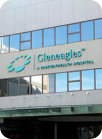MBBS (S’pore), FRCS (Edinburgh), MMed (Surgery), MSc (Bioinformatics), FAMS (General Surgery)
MBBS (S’pore), MMed (Surgery), FRCS (Edinburgh), MPH (USA), FAMS (General Surgery)
Laparoscopic pancreatectomy is a minimally invasive surgery to remove part or all of the pancreas. It involves small 'keyhole' incisions rather than a single large cut, offering patients less pain, shorter hospital stays, and faster recovery. While the exact timeline can vary based on individual factors, most patients achieve full recovery within approximately two months.
Post-Operative Recovery in the Hospital
Patients typically stay in the hospital for 3 to 10 days after surgery, depending on how the body responds to surgery. During this time, the healthcare team will:
- Monitor vital signs, pain levels, and surgical wound healing
- Check for signs of complications such as bleeding or infection
- Manage pain using intravenous or oral medications
- Provide intravenous fluids and gradually reintroduce food
Diet progression starts with clear liquids after a few days, slowly moving toward solid foods. Eating smaller meals (5–6 per day) and chewing thoroughly can help ease digestion. Some symptoms like bloating or diarrhoea may occur early on and should improve with time.
Light walking is encouraged within 24 to 48 hours after surgery to reduce the risk of blood clots and encourage bowel movement. Try to walk a little more each day to support circulation and healing.
Preparing for Discharge
Before you are discharged from the hospital, your healthcare team will ensure that you:
- Can eat and drink without difficulty
- Can walk and manage basic self-care activities
- Have a stable temperature and no unresolved medical issues
- Can manage pain with oral medication
- Show no signs of complications
Managing Your Recovery at Home
Once at home, it is important to follow the care instructions provided. These will include:
Incision & Wound Care
- Keep the incision area clean and dry
- Wash gently with warm, soapy water and pat dry
- Avoid harsh products like hydrogen peroxide or alcohol
- Cover the area with gauze if needed, especially if there is light drainage
- Watch for signs of infection, including redness, swelling, or unusual discharge
Drain Care (If Applicable)
If you are discharged with a surgical drain, your team will provide specific instructions. Drains are usually removed during follow-up appointments.
Medications
Your prescribed medications may include:
- Pain Relievers: Take as directed
- Antibiotics: Complete the full course, even if you feel better
- Anti-Ulcer Medicine: If needed, to protect the stomach lining
- Enzyme Supplements: To support digestion if the pancreas is not producing enough enzymes
- Diabetes Management: If your ability to produce insulin is affected, blood sugar monitoring and insulin may be required
Diet
You may lose weight after surgery, which is common. Appetite usually returns in about eight weeks.
- Begin with low-fat, soft, and easily digestible foods
- Eat small meals every few hours
- Drink plenty of water
- Chew food well and eat slowly
Some patients eventually reduce or stop medication for blood sugar control once recovery stabilises.
Activity Restrictions
For four to six weeks, you should avoid:
- Heavy lifting (e.g., children, groceries)
- Household chores that involve straining
- Exercise such as jogging, biking, or weight lifting
You may resume driving two to three weeks after surgery if you are not taking pain medication. Light desk work may be possible within three to four weeks, but full recovery may take up to two to three months.
Follow-up Appointments
During the first two months after surgery, you will have follow-up appointments scheduled every two weeks for postoperative evaluations. These visits are crucial for monitoring your recovery and addressing any concerns.
Here is what to expect during your follow-up appointments:
Initial Visit
At this appointment, you will meet with your surgeon who will review your pathology and surgical reports, examine your incisions, and remove any remaining staples and tubes.
Ongoing Monitoring & Support
During your initial and subsequent appointments, your doctor will discuss your diet, bowel functions, and pain control to ensure you are recovering well. Keeping a journal of what you are eating and drinking (including amounts and times) can be very helpful to aid with these discussions.
Imaging and Blood Tests
Depending on the type of resection and the pathology results, you may undergo regular imaging studies to check for any cancer recurrence. Blood tests will also be performed to track markers and liver function.
Closing
Most patients who undergo surgery for pancreatic cancer will also require a course of chemotherapy after their operation. This typically begins six to eight weeks after surgery.
If you have questions about your recovery after laparoscopic pancreatectomy, or if you are experiencing new or lingering post-operative symptoms, please consult your specialist. Your pancreatic surgeon can best assess your condition and recommend the appropriate follow-up steps. Contact us today to book a consultation.
Our Pancreatic Cancer Surgeons
Dr Victor Lee Tswen Wen
Senior Consultant Surgeon
MBBS (Singapore), FRCS (Edinburgh), MMed (Surgery),
MSc (Bioinformatics), FAMS (General Surgery)
Dr Victor Lee is an experienced HPB & Transplant (liver, pancreas and kidney transplant) surgeon with subspeciality training at the Royal Infirmary of Edinburgh, United Kingdom. He has a special interest in advanced laparoscopic surgery and major surgeries involving the liver, gallbladder, pancreas and bile duct. Dr Lee is known for his clear and thorough explanations during consultations, helping patients understand and navigate their surgical options.


Dr Tan Ek Khoon
Senior Consultant Surgeon
MBBS (Singapore), MMed (Singapore), MPH (USA),
FRCS (Edinburgh), FAMS (General Surgery)
Dr Tan Ek Khoon is an experienced HPB & Transplant surgeon based at Gleneagles Hospital and Mount Elizabeth Orchard Hospital. He completed his subspecialty training at the renowned Mayo Clinic in the USA and now focuses on transplant oncology and complex cancer surgeries, including minimally invasive procedures using advanced laparoscopic and robotic techniques. Recognised for his patient-centred care and collaborative approach, Dr Tan has received multiple awards for service excellence.




